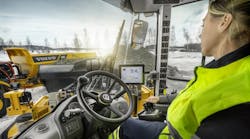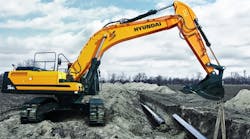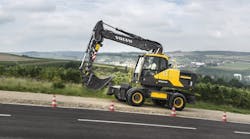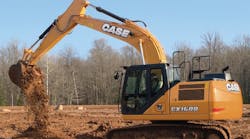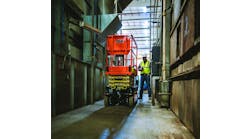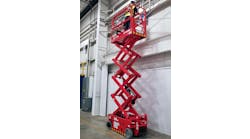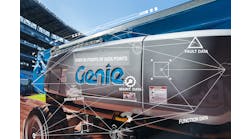RER recently interviewed a series of earthmoving manufacturers, including Eric Yeomans, GPPE product manager for Volvo CE. Yeomans talked about new technological innovations, Volvo’s Dig Assist and Load Assist programs, improvements in compact excavator hydraulics, and more.
RER: What are the latest technological developments with your equipment?
Yeomans: At ConExpo 2017, Volvo unveiled a number of new machines, including two new wheel loaders — the L260H and L350H. However, the biggest announcements came in the form of technological innovations – including ActiveCare Direct and a suite of machine control solutions available through the Volvo Co-Pilot interface.
ActiveCare Direct is a telematics monitoring service offered directly from Volvo and supported by the extensive Volvo dealer network. Volvo has built an uptime center with an experienced team of data analysts who provide 24-7/365 active machine monitoring, as well as monthly fleet reports that provide insights that can help improve fleet utilization, uptime and efficiency.
In addition to telematics solutions, Volvo has made strides in providing intuitive machine control solutions for operators to increase accuracy and efficiency on the job site. Using the Volvo Co-Pilot high-resolution touchscreen interface, operators can use programs like Dig Assist for excavators, Compact Assist for asphalt compactors and Load Assist for wheel loaders to see real-time data that helps improve job accuracy.
In the future, customers can expect to see updates to Volvo Co-Pilot options, and new solutions for other machines, including articulated haulers and soil compactors.
What trends do you see and do you expect to see in earthmoving equipment in the near future?
Yeomans: The availability of machine control systems is increasing, such as the Volvo Dig Assist and Load Assist programs available on the Volvo Co-Pilot interface, which allow operators to input job parameters and see real-time data to ensure the job is done right the first time — minimizing errors and the need for rework.
Volvo Load Assist is available on the L110H-L250H Volvo wheel loaders, and provides real-time payload data and work order management functionality to the operator, as well as documentation of work orders for owners and customers. With the 10-inch, high-resolution Co-Pilot interface, the operator can set up projects in just a few touches by selecting the customer name, work order number, target tonnage and material type. Once all the parameters are set, the operator can track progress in real time as the job is underway. The display shows tonnage currently in the bucket, tonnage already delivered to the truck (or other delivery location) and tonnage left to be delivered to complete the job.
Volvo Dig Assist is an intuitive excavator machine control system that allows operators to easily input job specifications and track progress along the way to ensure the job is done right the first time, every time. The operator can see the real-time position of the bucket and machine in relation to target grade and depth. With the optional In-Field Design functionality, the operator can draw custom digging profiles directly from the cab.
It appears that hybrid machines are now more popular than in the past? Do you find more of a demand for them in the rental market?
Yeomans: We can’t speak to the popularity of hybrid equipment for the rental sector, but Volvo is always experimenting with new technology, including creating hybrid and electric concept vehicles. For instance, the Volvo HX02 concept battery-electric, fully autonomous load carrier made its first public appearance at CONEXPO-CON/AGG 2017. Previously, the Volvo Concept Lab unveiled the LX1 electric hybrid wheel loader concept vehicle, and in May 2017, they unveiled the EX2 compact excavator — what is believed to be the first fully electric compact excavator prototype.
Are you finding increased demand for any particular kinds of machines from the rental market?
Yeomans: We continue to see compact excavator growth, with recent data showing that customers are selecting compact excavators to replace the role of a backhoe. Volvo is dedicated to continuing our growth in the compact excavator market so that we can be a one-stop shop for any customers’ application needs.
What kind of knowledge of technology is necessary for rental companies to help their contractor customers?
Yeomans: It’s important for rental houses to stay up-to-date on current and emerging technology trends, because customers often first look to rental houses for assistance in picking out the best equipment, even when it comes to making sure they understand what equipment would be best to meet their needs prior to bidding jobs. First, customers learn they can become more efficient on the job site using new technologies such as the Volvo Co-Pilot suite of programs — Dig Assist for select excavators and Load Assist for select wheel loaders. Second, customers can test programs before making purchasing decisions, ensuring the return on investment for the technology.
How have machines improved (or not improved) with the advent of Tier 4 technology?
Yeomans: With Volvo’s expert engineering, we’ve considerably lowered horsepower on some models of skid steers and compact excavators — meeting Tier 4 emissions standards — while still improving the performance and power of the machine. The engine and hydraulics work in concert to increase performance. For example, improvements in compact excavator hydraulics result in increased lift capacity and breakout/tear out forces while remaining in the required horsepower range to meet Tier 4 emissions regulations.
On Volvo excavators, the advent of Tier 4 technologies coincided with the release of the Volvo positive control hydraulic systems, which drastically improve the ability to control machines while delivering significant fuel savings. Additionally, the transition to electro-hydraulic systems also enables the use of response modes, which allows operators to customize how fast the machine reacts to operator control input on the joysticks.
Engine and hydraulics are closely related and are very significant in pushing the market to evolve. Due to recent changes in emissions regulations, manufacturers need to look for ways to stay within the horsepower ranges without requiring any additional purifying systems on the machines. To achieve this, engineers must match engine power with the hydraulics — ensuring enough hydraulic power to operate the attachment, while getting the same or better overall performance.
Are earthmoving machines more fuel efficient than in the past? If so, how, and to what degree?
Yeomans: Across our entire lineup, each new model series comes with both increased fuel efficiency and increased performance. For example, our ECR235E and EC160E excavators are equipped with a Volvo Tier 4 Final engine that delivers up to 10 percent fuel economy improvements over previous models. To boost productivity and efficiency, machines offer integrated working modes, which allow the operator to choose the best work mode for the application — I (Idle), F (Fine), G (General) or H (Heavy). To further improve fuel efficiency, these machines are equipped with auto idle and engine shutdown features. A winning combination of enhanced hydraulics, improved ECO mode and convenient service access contribute to lower overall costs and higher productivity.
In the H-Series wheel loaders, including the L110H-250H, Volvo has implemented a dry parking brake in line with the efforts to reduce fuel consumption, as an external dry disc parking brake eliminates drag losses caused by the internal wet multidisc. In addition to fuel efficiency improvements, the dry parking brake is easier to maintain versus the wet parking brake, as it’s located externally for easier access. There is a new gear ratio in the transmission, so the gap when changing gears is much tighter, which gives the wheel loaders faster acceleration and improved hill climbing performance, and better fuel efficiency. In models L110H-L250H, Volvo has upgraded the torque converter to improve fuel efficiency in the bucket filling phase and more rim pull for stock piling. Volvo has also released the high performance bucket, rehandling bucket and rock bucket for its wheel loaders, which have contributed to significantly improving productivity and fuel efficiency.
On our latest G-series articulated haulers, Volvo Dynamic Drive is a new software and hardware update that allows the engine to be able to take information from the onboard weighing system, and will know how much weight is in the bed, how fast the machine is going, what gear the operator is in, at what inclination up or down hill, and will automatically select the most fuel-efficient transmission gear. With Dynamic Drive, customers can expect a 3 to 10 percent fuel efficiency improvement, depending on the model.
